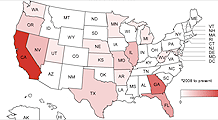Banks brace for tough second half of '09
Loan losses and regulatory reforms will give bankers and investors plenty to worry about in the months ahead.
 |
| Following a big rally this spring, both the KBW Bank Index and S&P Bank index have moved little - a trend that may persist for the rest of the year, warn experts. |
NEW YORK (CNNMoney.com) -- Stress tests. Massive government interventions. Speculation that the government would nationalize Citigroup and Bank of America.
Suffice it to say that the first half of 2009 was anything but normal for the usually sleepy U.S. banking sector.
But even as some sense of calm has returned, there are few indications that lenders will make a full recovery by year's end.
For starters, many banks are still trying to get a firm grip on their unwieldy loan portfolios that continue to deteriorate.
The focus for many big-name banks lately has been on credit cards as more and more consumers find themselves out of work. Construction and development loan problems remain front and center for smaller lenders, particularly community banks.
As the recession drags on, however, losses are starting to migrate to other areas, including commercial and industrial loans, as well as traditional commercial real estate, said Blake Howells, an analyst at Becker Capital Management, a Portland, Ore.-based investing firm which oversees $1.7 billion in assets.
Howells and others suggest that as a result, banks will have to continue building their loan loss reserves through the end of this year and quite possibly into 2010.
That could be a further drag on profits -- especially for regional banks. Full-year earnings for regional banks in the S&P 500 are expected to decline 34% this year, according to Thomson Reuters.
Large diversified financial services firms, which include JPMorgan Chase (JPM, Fortune 500), Bank of America (BAC, Fortune 500) and Citigroup (C, Fortune 500), are expected to post a 19% increase in earnings for 2009. Experts said that the recent flurry in capital markets activity, including newly-issued corporate debt, is helping buoy results of the larger banks.
It hasn't hurt that the 19 stress-tested banks themselves have conducted $93 billion in debt and equity offerings since May, according to SNL Financial. Fees tied to those offerings have also helped to boost profits at those same big banks.
"Banks that have capital markets operations are clearly are benefiting from those markets in first half of this year," said Howells. "Whether that holds for the second half remains to be seen."
This uncertainty, as well as broader questions about banks' underlying earnings power, has caused bank stocks to stall after a sizeable rally in March and April.
Both the KBW Bank Index and S&P Banking Index - two of the most widely-watched barometers of the sector - have doubled in value from their March lows. But they have largely traded sideways since the government released the results of its stress-test program in May.
The outlook for U.S. banks has been clouded by other issues too, namely which banks might be next to escape the government's controversial Troubled Asset Relief Program, or TARP, and whether some of the biggest banks indeed have enough capital on hand to weather the recession.
"There are a lot of questions about whether banks are adequately capitalized to deal with a recovery that goes on for several years," said analyst Nancy Bush, founder of NAB Research.
There's also the question of how Congress will decide the fate of the financial services industry. Lawmakers on both sides of the aisle have appeared willing recently to back some of the changes proposed by President Obama two weeks ago as part of his sweeping regulatory reform plan.
Some of those proposals, however, including the creation of a new agency geared towards protecting consumers from financial products and stiffer capital requirements for banks, are certain to impact banks' profitability, note experts. But no one seems to know by how much.
Tom Kersting, a financial services analyst at St. Louis-based Edward Jones, estimates that banks will feel the pinch as they spend more money to implement some of these proposed regulatory changes, but adds that the costs will not have a "material impact."
More changes in Washington could also become an issue before long. At the end of October, the Federal Deposit Insurance Corp. is expected to bring to an end its debt-guarantee program, which has helped banks access cheap forms of financing.
And of course, there have been rumblings that the Federal Reserve may have to move to raise interest rates later this year as part of an effort to unwind some of its ongoing rescue programs and combat the threat of inflation in the future. Such actions could potentially weigh on recovery efforts for banks that have relied on wide interest rate margins to borrow and lend money.
Investors, however, may take comfort in knowing that banks are unlikely to undergo the type of turmoil that defined the first half of 2009, which would certainly be welcome news for the hard-hit industry.
"We certainly believe we are past that point," said Kersting. ![]()


